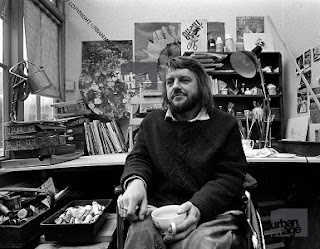Around the late 2000s I spent a lot of time on the forum for ProgArchives.com. It was here that I first became aware of a genre known as "post-rock". As I understood it, post-rock was characterized by elongated song structures, but relatively static music. In this style, mood, texture, and the building and release of tension over otherwise simple music was paramount. It was analogous to soundtrack music, where the film in question was inside the listener's mind.
I was surprised to learn that one of the formative albums often cited as giving rise to this genre was Spirit of Eden by Talk Talk, an album I had owned and loved for nearly 20 years by that time. So I was definitely curious to learn more. A forum post cited Godspeed You! Black Emperor's Lift Your Skinny Fists Like Antennas to Heaven as a key album in the post-rock genre. I had heard the name before but mistakenly assumed they were a dark metal band because of their name.
Godspeed is a 9-piece band from Montréal featuring a large array of instruments. Each player is simply described as a "musician," not as a specialist on a particular instrument. The photo reveals violinist Sophie Trudeau, two bassists (electric and acoustic), a drummer, and a kneeling person. And that's less than half the band.
Lift Your Skinny Fists spans four vinyl sides, with one continuous program of music occupying each side. Each program consists of separately named movements, but the complete pieces are commonly known simply as "Storm", "Static", "Sleep", and "Antennas to Heaven". The two CDs are indexed as just four tracks.
Godspeed's general strategy is to take simple ideas and develop them symphonically, gradually building tension to reach a deafening climax before breaking down and starting again. Often, as on the introduction to "Sleep", they use spoken word tapes to set the scene (in this case, an old man reminiscing about how people used to sleep on the beach in Coney Island, but not anymore). The voice recordings help to underscore the political undercurrents beneath the surface of their music.
The insert on the LP and CD offers a written diagram of how the band imagined each side progressing, giving some insight into the band's composition strategy.
My first experience listening to Skinny Fists was quite memorable. I had just purchased the album on CD, and while driving back home, I heard the opening track, "Storm". Somehow, my imagination merged with the music, and the uplifting opening theme (like a theme from an imaginary western, to borrow an idea from Jack Bruce) actually caused me to choke up and shed a tear or two on that drive. The other three sides are less immediately poignant, but also raise emotional peaks like those on "Storm". "Sleep" in particular builds gradually from quiet beginnings with a musical theme incorporating crying guitar notes akin to a musical saw or a theremin, eventually peaking in volume and intensity.
As I recall, Dan was not particularly impressed with this album when I first thrust it upon him, but I nonetheless thought it important to include on this blog, both for its influence on the direction of my post-millennium prog interests as well as the album's stature within the progressive rock scene. For this blog entry, Dan was amenable to giving it a fresh listen to see what his reaction would be today. For me at least, this Godspeed album may not be an all-time favorite, but it helped introduce me to a new strain of progressive rock that continues to captivate me.
Dan:
Steve is correct about my first encounter with Lift Your Skinny Fists. In my defense, it was my practice at the time to audition new music on headphones while working out at the gym. I had a nice pair of headphones and a digital media player capable of playing lossless files. Even so, I remember struggling to hear the quiet passages of "Storm" and the other songs, only to have the crescendos blow out my eardrums. Lesson learned: don't play anything with a wide dynamic range in a noisy gym (or while driving a car).
Another lesson learned through our blogging project is to listen carefully enough to new music so as to inform some intelligent remarks about the selected album. So I listened to all four suites again five months ago and once more before writing these comments. As I discovered with my jazz blog MORE FAVORITES: Reflections on Jazz in the 1980s (jazzinthe80s.blogspot.com), writing about music is a great way to become more intimate with records, both new music and those that I have owned for decades. In fairness to the performers, the details that distinguish the character of their music shouldn't be missed.
At home with my hi fi, many significant details of Lift Your Skinny Fists are revealed, from the prerecorded voiceovers to the burbling interplay during the quieter passages. The sad rant on "Static" and the Coney Island remembrance on "Sleep" leave the most lasting impressions, but all of the prerecorded voices shape the music in peculiar ways.
As a result of my newly found intimacy with Lift Your Skinny Fists, I'm happy to reverse my previous blowoff. Godspeed are comparable in approach, if not intensity, to two other groups I like - Green Room and Zaum - which are marginally classifiable under jazz. Godspeed have a wider dynamic range due to the crescendos and consequently more diversity within the post-rock genre.






























